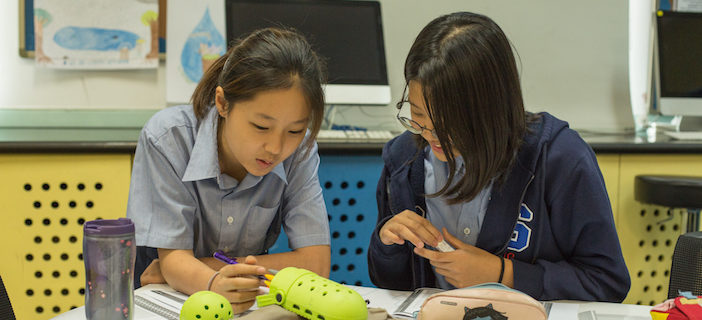“Are you ready?” Alana Martin-Haggarty, Middle School Learning Community Leader at Yew Chung International School of Beijing (YCIS Beijing), asks to a roomful of excited 10 to 13-year-olds.
“No!” the students inevitably chorus, but they are joking. The enthusiasm and energy are evident, eager to see the launch of an innovative new program: Genius 100.
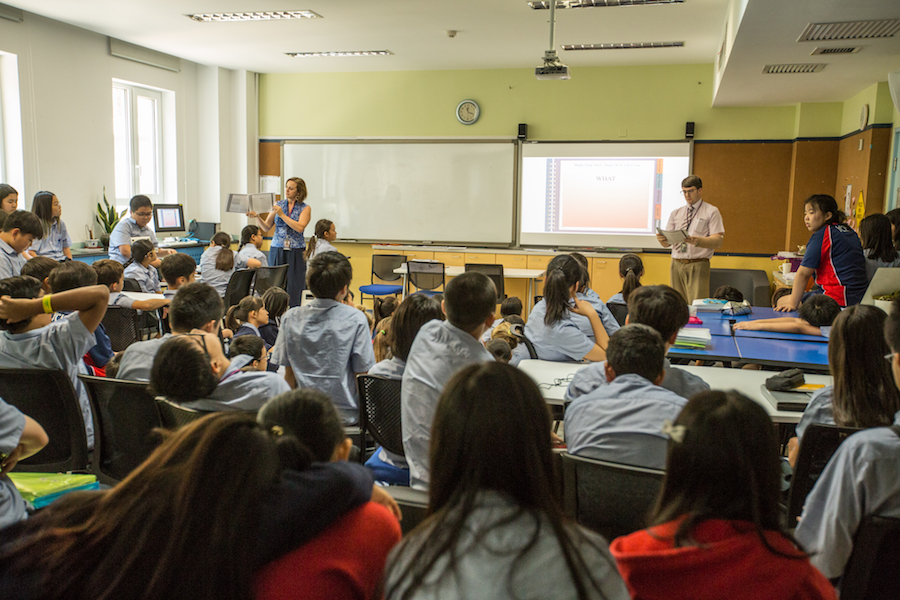
Middle school students get ready to take part in a Genius 100 class
“G100 challenges students to work through a process of continual research, building, and reflection to try to solve a problem or answer a question,” Martin-Haggarty told us the day before. “It follows the idea of brainstorming what you’re passionate about. It can be linked to the curriculum, but at other times it’s purely a passion project.”
But the students need to demonstrate more than just their own interest in the subject.
“Once they have an idea they want to follow,” she continued, “they have to pitch their projects. They have to explain what their product will be, what they’re trying to achieve. Is it to help others, teach others or inform them about some problem or issue? Instead of ‘I’m going to research dolphins because I like dolphins’, we discuss how we can deepen the projects, link them to the real world.”
It’s this process of brainstorming and pitching that has brought the whole Middle School together. The students are presented with some very confident and funny pitches which Year 11 (Grade 10) students developed for the Creativity, Activity, Service (CAS) element of the International Baccalaureate. Then, after a discussion about the art of pitching, they split into smaller groups to prepare their ideas. We talk to them and discover some students have already smartly worked out how to combine the curriculum with their own enthusiasms.
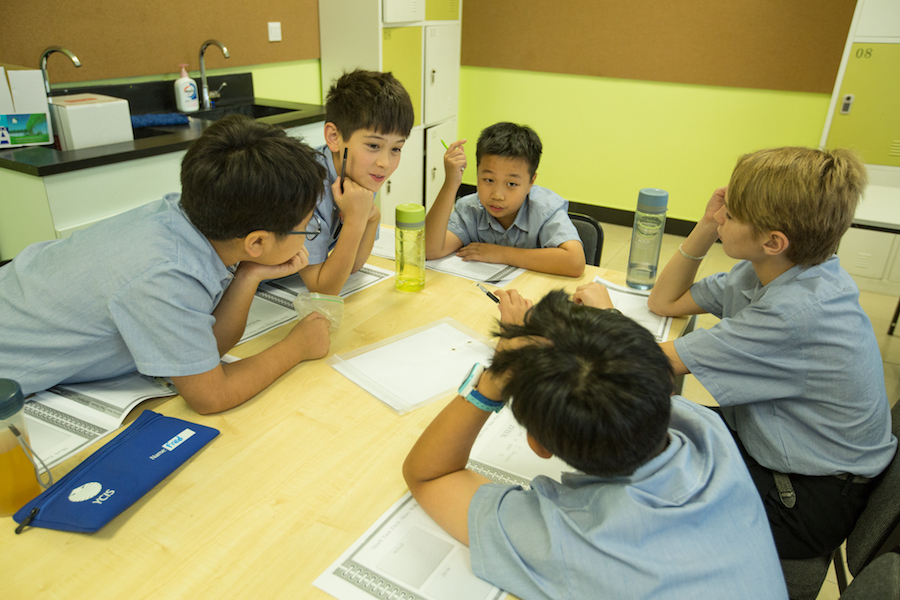
Students work on G100 projects in small groups
“We’re going to build a medieval town in Minecraft,” Thomas (Year 8) tells me. “It will help our fellow students understand the architecture,” adds his friend Rayyan.
Others have grand ambitions. “I’m going to write my own book,” says Annie in Year 7. We ask what outcome she is hoping for. “I want to see if people like it,” she answers. “It could be a major career!”
The students record their ideas in G100 project journals, which help them to focus on the essential points they will need to convey in their pitches. “The resources come from an online course run by education guru AJ Giuliani that all the teachers involved have completed,” Martin-Haggarty told us “G100 is a big trend in a lot of education systems. However, most run it as an after-school activity. We’ve allocated 100 minutes of their weekly scheduled classroom time: two consecutive 50-minute blocks for years 6, 7, and 8 all at the same time. It takes courage to change around the timetable as it’s a big breach of tradition! So it’s something YCIS can be proud of.”
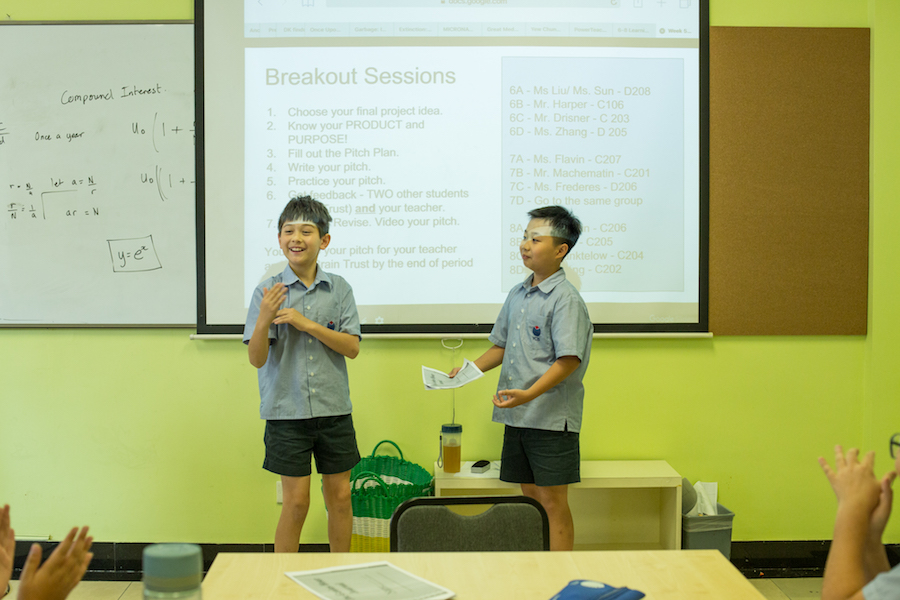
The classes also teach valuable pitching and presentation skills
Back in the classroom, the students are practicing their pitches to their peers. Nathanael and Vincent from Year 7 want to develop a mobile, environmentally-friendly water filter. The pitch, inevitably for 11-year-old boys, includes comedy vomiting. “We need a good hook,” as Vincent put it, “with both humor and a bit of seriousness.”
In Year 8, Aoife and Gaia are proposing to teach each other their first languages, an excellent example of the peer-to-peer learning Martin-Haggarty hoped would result from the program. “For me,” she said, “it’s about having the students directly involved in building their curriculum, engaging them to develop their learning. It would be wonderful if they start to think about how they can benefit others, connect with each other, learn from each other.”
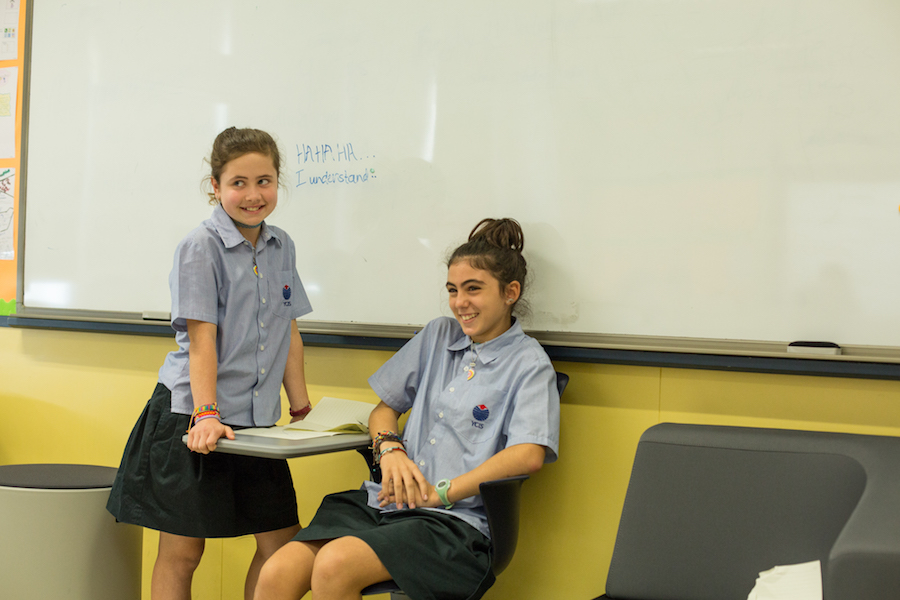
The G100 classes are also designed to encourage peer-to-peer learning
She sees G100 as fitting in well with YCIS’s wider vision. “It focuses on our new learning community philosophies, where we give the students depth and breadth to their learning. By allowing them to do personal passion projects, we can help them delve deeper into their understanding of the curriculum. It reflects where we’re heading with secondary [high school]learning communities.”
Watching the students pitch their ideas confidently and begin to learn the skills of project management, it’s easy to see how G100 is equipping them to be the innovators and entrepreneurs who will take on the challenges of the 21st century.
This post is sponsored by YCIS Beijing.
Photos: Uni You

